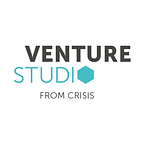PropTech and Homelessness: The Beginning and the End.
These insights have been compiled and written by Andrew Bailie, Marketing and Partnerships Lead at the Venture Studio.
The Venture Studio was established to accelerate the end of homelessness through strategic investments in start-ups. We have initially concentrated on ventures that apply new technologies to the property and real estate industry. After our first year in operation, we have been nominated as one of the UK’s top PropTech Investors.
Our early momentum reflects decades of investment into innovation, building on the insights of people who have lived experience of homelessness. We have also worked closely with People’s Postcode Lottery. The generosity of their players has helped turn this idea into reality.
Ending homelessness….requires a change in the way we all address homelessness, as individuals, as charities, as entrepreneurs and as businesses — as well as public services. If we are to succeed, we’re going to have to disrupt the way things work.
-Jon Sparkes, CEO, Crisis
This article explains our early focus on this sector, and why we think PropTech is part of the solution to ending homelessness. It also highlights some opportunities that we are particularly keen to explore with founders.
Direct alignment to housing
After over 50 years of supporting individuals experiencing homelessness, we believe that new approaches are required to:
- Increase the supply of dignified, affordable housing, in places where people need to live
- Make tenancies more financially and physically accessible
In our first year, we have met several entrepreneurs who speak directly to these goals. Some companies are constructing high-quality, sustainable, affordable modular homes on underutilized land (Agile Homes & Property). Others are using machine learning to assess properties for extension (Lanu). Increasing the scale of these ventures and startups with similar potential is an opportunity to make more affordable housing available for more people.
Housing Led’ or ‘Rapid Rehousing’ approaches to ending homelessness simply mean trying to get someone into their own home as quickly as possible and providing them with the support they need to make it work. It involves minimising the amount of time spent in temporary accommodation and seeks to minimise the number of moves people have to make before they move into a permanent home. ‘Housing First’ is a form of ‘Housing Led’ solution to homelessness which supports people with the most complex needs
While the PropTech sector is maturing, Venture Studio aims to embed the voice of people affected by homelessness. Our members have been key contributors at every stage of the Venture Studio, and will remain central to any future success. As digital innovations are tested, scaled, and consolidated, our Lived Experience panels equip us to spot gaps and evaluate applications. These perspectives don’t just help us to make good investments — they can empower founders to create the best possible product and services.
Knock-on impact
The ongoing transformation of the property, land, and real estate industries extends beyond the supply of residential space. Yes, we need thousands of new homes to be created at social rent, every month. However, we also need to maximise the social value of existing housing.
For instance, sustaining long-term tenancies for those on lower incomes is key to preventing homelessness from occurring in the first place. Data, and the safe sharing of information, can improve communication between renters and landlords. Opportunities in this space may focus less on bricks and mortar, and more on the tools available to both groups.
Furthermore, we frequently meet entrepreneurs, who are working to aggregate property data, making it easier to find and rent a home that is right for a particular tenant. None of these ideas are a perfect fix. However, if they are successful, we think they could reduce the number of empty homes and help find the right home for people experiencing homelessness.
Why here?
There has been a significant increase in the number of impact investors, with the market now estimated to be $715bn. Against this backdrop, the UK PropTech ecosystem is vibrant and continues to grow. According to Oxford University’s Future of Real Estate initiative, investment into this space significantly outpaces comparable European countries. For instance, investment into UK PropTech is approximately 5x higher than what is seen in Germany. As we primarily support early-stage, revenue-generating companies, the presence of follow on investors helps us to be ambitious.
Meanwhile, organisations such as Ordnance Survey places valuable data into the public domain, fostering innovation in geospatial analysis and planning. A vibrant community of accelerators and founder networks (such as our friends at Deen Developers) draw attention to formidable founders from diverse backgrounds. The strength and depth of this ecosystem has created a steady stream of startups, who can access capital and support as they grow.
What next?
We are looking to back founders who can link their success to social and financial returns. In particular, we are keen to use our convening power to create positive ripple effects for those at most risk of homelessness. When we back a founder, we leverage working capital alongside data, policy expertise, and networks, to accelerate the end of homelessness.
The growth of PropTech in the UK is an innovation success story — for founders and funders alike. However, this success sits alongside over 200,000 households experiencing the worst forms of homelessness. We have lots of work to do. One year into this journey, we’re confident that we have found the right space to make a scalable impact.
Work with us
Intro your venture: venture.studio@crisis.org.uk
Apply for investment: https://www.smartsurvey.co.uk/s/A26GF6/
Follow the Venture Studio from Crisis on Twitter & LinkedIn
Useful resources
